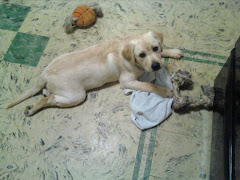The zoo offered a first look at the now healthy cubs Wednesday and hopes to place them on view to the public in the cheetah yard by the end of the summer.
Cheetahs are the fastest animals on land, but scientists said every surviving cub is critical to sustaining the species, which is threatened with extinction in the wild. These cubs are genetically valuable because their mother and father were first-time parents.
When the cubs' mother, 5-year-old Ally, gave birth to the first cub in late April, though, problems quickly developed. Ally abandoned her first cub and left him in the cold on a snowy day. Then her labor stopped, even though she had three more cubs waiting to be born.
Zoo veterinarians performed a "rare and risky" emergency cesarean section and saved one more cub, along with the cheetah mother. Two other cubs died.
"You're always sad that you couldn't save them all," said veterinarian Copper Aitken-Palmer. "But I'm thrilled that we have two, and I'm thrilled that the mom is doing well, too."
The month-old cubs don't have names yet, but their fuzzy hair already has spots identifying them as cheetahs. What would you name these adorable cubs? Explain your choice!
There's one male and one female, and they're growing fast. At feeding time, they are eager to get their bottles, clawing and chirping to get milk from their handlers. The cubs are also beginning to transition to solid foods as their teeth come in, dining on moist grocery store cat food to start.
"Because they're cubs, everything is kind of exaggerated," Aitken-Palmer. "So they have really long legs, really poufy hair on their heads. But they're pretty cute."
Zoo veterinarians only knew of two other C-sections performed on a cheetah before they tried it to save this cheetah family. One had been successful, and the cubs died in another case.
"It's very rare and it's very risky," said cheetah biologist Adrienne Crosier. "We were certainly concerned about the welfare of the mother."
When the female cub was born, she had a heartbeat but didn't breathe on her own for several hours. Both cubs and mother were in intensive care for three days.
Because cheetahs are endangered, North American zoos are trying to build a self-sustaining population. It's been estimated there are only 8,000 to 12,000 cheetahs left in the wild, Crosier said.
"Every cub that is born into this population is critical," Crosier said, "and we're only producing a fraction of the cubs that we need every year to become sustainable."
There's one male and one female, and they're growing fast. At feeding time, they are eager to get their bottles, clawing and chirping to get milk from their handlers. The cubs are also beginning to transition to solid foods as their teeth come in, dining on moist grocery store cat food to start.
"Because they're cubs, everything is kind of exaggerated," Aitken-Palmer. "So they have really long legs, really poufy hair on their heads. But they're pretty cute."
Zoo veterinarians only knew of two other C-sections performed on a cheetah before they tried it to save this cheetah family. One had been successful, and the cubs died in another case.
"It's very rare and it's very risky," said cheetah biologist Adrienne Crosier. "We were certainly concerned about the welfare of the mother."
When the female cub was born, she had a heartbeat but didn't breathe on her own for several hours. Both cubs and mother were in intensive care for three days.
Because cheetahs are endangered, North American zoos are trying to build a self-sustaining population. It's been estimated there are only 8,000 to 12,000 cheetahs left in the wild, Crosier said.
"Every cub that is born into this population is critical," Crosier said, "and we're only producing a fraction of the cubs that we need every year to become sustainable."










No comments:
Post a Comment